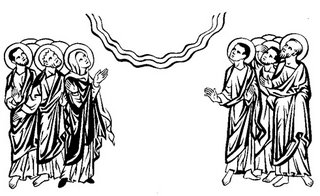Wednesday Evening (First Vespers of the Ascension)
 This evening many Christians turn their thoughts to our Lord’s ascension: what is means to the Church, to the world, and to one personally. In his Letters and Papers from Prison, Dietrich Bonhoeffer says, “Today is Ascension Day, and that means that it is a day of great joy for all who can believe that Christ rules the world and our lives.”
This evening many Christians turn their thoughts to our Lord’s ascension: what is means to the Church, to the world, and to one personally. In his Letters and Papers from Prison, Dietrich Bonhoeffer says, “Today is Ascension Day, and that means that it is a day of great joy for all who can believe that Christ rules the world and our lives.”Years ago I found Jesus’ ascension something of a great puzzle; as a boy I often wondered why Jesus could not have set himself permanently, visibly, openly somewhere on earth, sort of like a pope in some sort of ecumenical Vatican. Oh, I supposed Jesus wouldn’t really want to live in a big place like that, but surely by living somewhere on this planet Jesus might have given us everlasting and continually visible proof that by his dying and rising God has finally set things right. After all, sometimes the psalms appointed for Ascension Day strongly suggest that God will set up his throne in the temple where “Kings shall bring gifts” to him for the temple’s sake” (68).
But Jesus decided not to take up an abiding residence in Jerusalem, Rome, London, New York City, or Richmond, Kentucky. The naked truth is that he's pretty much disappeared; he’s gone to be somewhere else, somewhere called heaven. It’s the plain teaching of Scriptures, and the ecumenical Nicene Creed says so: “He ascended into heaven and is seated at the right hand of the Father.”
Several years ago M. Basil Pennington, a Cistercian monk and one-time abbot (who died last year) visited me in Massachusetts and gave me a long five-minute blessing with his big hands solidly on my head. His journals from trips to the Holy Land have just been published. After visiting the spot on Mount Olivet where Jesus is said to have ascended, Basil says:
It is good that Jesus ascended. His mission was complete. He gave us all. He deserves to sit on the right hand of the Father in glory. The reality of his Ascension gives us the courage to transcend ourselves and open us to divine contemplation. In Christ’s going ahead, we are assured that there is heaven for all of us humans, there is intimacy and at-homeness with the divine.
Basil’s right. Any desire for Jesus to live on a certain street in Richmond is much like that desire of Peter, James, and John to domesticate the Transfiguration. But Jesus would have none of that so that "we can transcend ourselves." The Ascension, I believe, tells us that Jesus is presents himself to us all at once in a multitude of ways:

when we read and hear the Gospel, when we table with Him in our homes and churches, when we meet children, when we visit prisoners, when we put diapers on babies, dresses on women, and coats on men, when we stand for justice, when we work for peace, when we serve the poor, when we reach out to our enemies, when two or three of us come together and name Him. In other words: when we love one another.
And then there's this which Mark Harris announces:
The ascension proposes that Jesus Christ has taken a place above all the principalities and powers in the world. He has become that to which we turn in order to find meaning and fulfillment in living.
In this sense the ascension is a key doctrine in these latter days. It is not one that patriots of any stripe will like very much. If we turn to Paul, we see that he speaks of the "spirit of wisdom" by which to discern these things. If we use that spirit, we'll be led to proclaim Christ's absolute rule--not as king, but as one who feeds and sustains.
Giving all other powers their due and their respect, we Christians cannot as a matter of total confidence or supreme trust embrace the flag, support the government, or pledge allegiance to the country for which they stand. Rather we end up having to say with Paul that Christ Jesus is "far above all rule and authority and power and dominion, and above every name that is named, not only in this age but also in that which is to come."
Perhaps the visual notion of the ascension is the movement of the Christ to the place at the head of the table as our great high priest, the head of the true state that is the church, the body of Christ of which Christians are all parts. Friend Jesus, move up!




0 Comments:
Post a Comment
<< Home